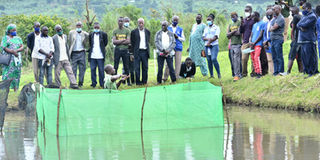Prime
Farm Clinic: Farmers get skills for bumper harvest

Farmers listen keenly as an agronomist explains a point at the fish pond during the Seeds of Gold Farm Clinic at Rwebitaba ZARDI last Saturday . PHOTO/GEORGE KATONGOLE
What you need to know:
- Honey takes three to six months to mature and this can only be identified by a thin white layer on the hive chamber.
The dust has now settled on the Seeds of Gold Farm Clinic held last weekend at the Rwebitaba Zonal Agricultural Research and Development Institute (ZARDI) in Fort Portal City and now is a good time to reflect on what we learnt.
Experts at Rwebitaba ZARDI did not reveal any ground breaking new research, instead, it was very much about back to the basics and getting the simple things right.
We learnt that the tea value chain has undergone a lot of transformation since 2011 including value addition. But lack of a policy is hurting the industry.
Naro has not released GMOs
Several farmers were not happy with improved crop varieties raising issues regarding the seed system while calling such varieties as genetically modified.
Dr Robooni Tumuhimbise, the director of Research at Rwebitaba ZARDI, dismissed the claims saying GMOs are yet to be legalised in Uganda.
“We do not have any genetically modified seed on the market. We have been tabling our request to have the law for GMOs but there is no law that allows us to have these materials. Whoever thinks that the new seeds on the market are genetically modified, should take note,” said Dr Robooni.
He explains that in the laboratory they are doing genetic modification but only as confined trials.
Value addition
Tea is Uganda’s third largest foreign exchange earner after coffee and gold yet it faces numerous challenges. From the obvious pests and diseases, experts at Rwebitaba ZARDI are focused on increasing the profitability of team farming, first by introducing high quality varieties that can still give high yields. Beyond proper agronomic practices, the experts have stepped into value addition. Although most of the products are at research level, there is potential for adding value to Uganda’s tea with green tea, which can attract Shs10,000 for 100g.
In the case of black tea, that would amount to Shs3,000. Other products include the green tea beverage and tea oil. Lead researcher Ronald Kawooya, explains that if farmers make business sense from growing tea, they will easily achieve the desired middle income status.
Go hapas
If you are involved in fish production and you have not heard ‘hapas’ mentioned, you have not thought about the possible money in clean seed multiplication.
Hapas were one of the main topics of discussion at the Farm Clinic, with the production and economic benefits of it highlighted more.
David Mununuzi, an aquaculture technician at Rwebitaba ZARDI, said demand for seed is increasing, making breeding key in fish production.
Mununuzi stressed that controlled fish farming can become profitable by small scale farmers with the use of breeding technologies such as hapas instead of tanks and open water sources.
One of the other issues discussed was about Mirror carp fish which researchers explain can have significant economic benefits instead of relying only on Catfish and tilapia.
Bees are gentle
The increased demand for honey and bee products is not sustainable and with stingless bees, the honeybees got a partner. As the name suggests, the stingless bees do not sting; thus, it is easier to extract the honey, pollen, and propolis frequently. Rwebitaba ZARDI is pioneering research into the economic viability of stingless bees, something that can be a game changer.
We have relied on honeybees for all honey products but it is just possible to keep gentle bees to achieve a similar goal. The question is how sustainable the enterprise can be.
Ronald Mugume, an apiculturist at Rwebitaba ZARDI, said stingless bees are going to become more important, especially with urban farmers.
“It is also quite profitable with further increase in profitability possible through further technical improvements and beehive management,” he said.
Gold in beans
The cereal seed business has gone through massive changes since bio fortified beans were introduced. The bean varieties which scientists encourage farmers to grow, are rich in iron and zinc.
Iron deficiency is one of the most common deficiencies in the world, mainly impacting women, children, and infants, most severely. Consumption of high iron beans has been proven to increase iron percentage in blood. Clean seed is available from seed multipliers and local seed businesses.




